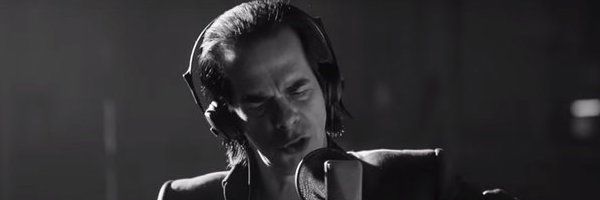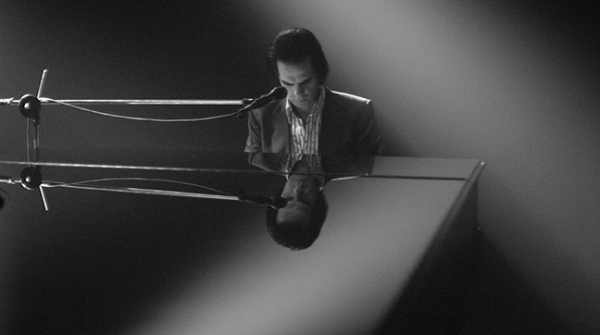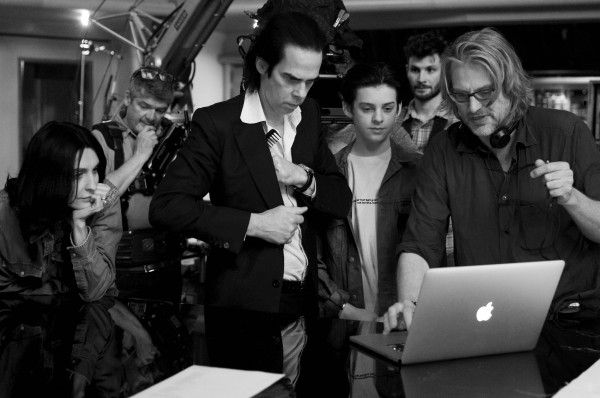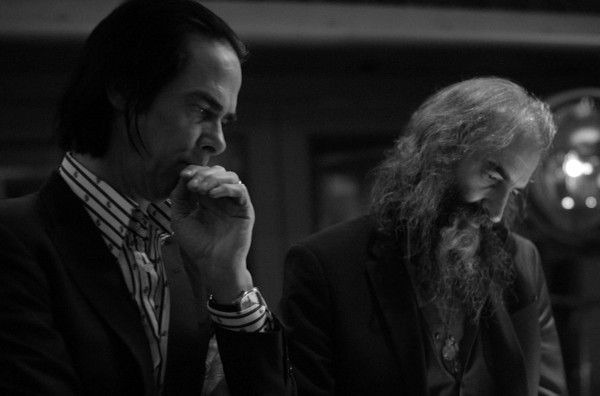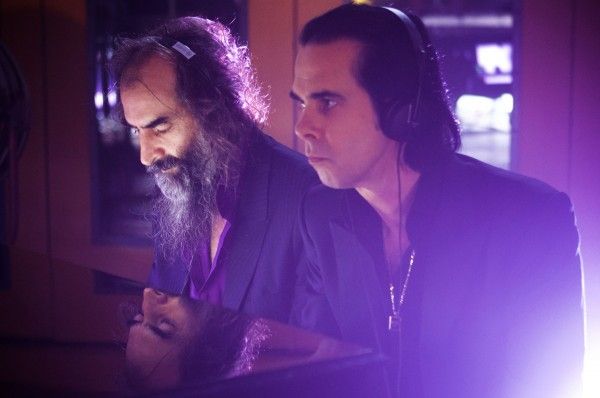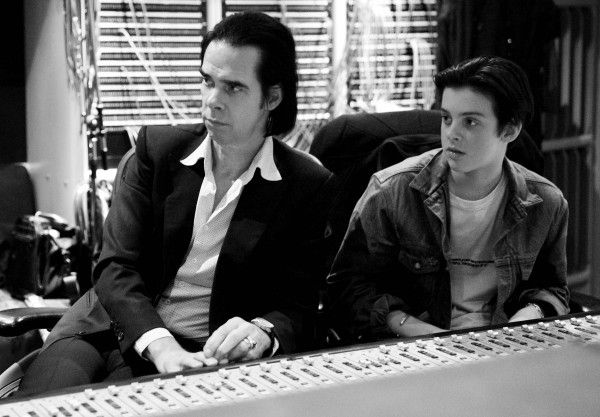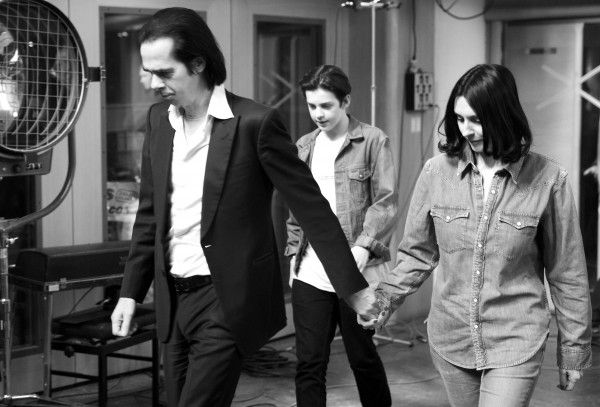Directed by Andrew Dominik, the documentary One More Time With Feeling delves into the writing and recording of the most recent Nick Cave and the Bad Seeds album Skeleton Tree and interweaves it with interviews and footage, accompanied by intermittent narration and improvised ruminations from Nick Cave, who was grappling with grief after the tragic loss of a child. Filmed in black-and-white and color, in both 3D and 2D, the result is a stark, fragile and raw look at the musician and his creative process.
Collider: This is such an insightful and personal look at Nick Cave, and unlike any sort of music documentary that I’ve seen before.
ANDREW DOMINIK: There’s not a lot of people with children dying, who are going to sit and make a movie six months later.
How did this come about? Did Nick Cave reach out to you directly?
DOMINIK: Yes. Nick and I have known each other for about 30 years, and we’ve been friends for probably less than half that time, even though we always got along pretty well. This film was just a practical solution to a problem. That’s how it began. From my point of view, it was almost an extension of just rallying around him, after Arthur died, and being there for the funeral and wanting to help. He had a problem, which is that he had this record that he had to promote, but he just didn’t want to go and do the usual two weeks of interviews because he knew that he was going to have to talk about the context of the record, in order to talk about the record, and the context is that his son died. I completely appreciate the stomach-turning aversion to turning that tragedy into a performance that has to be enacted, over and over again, for each new journalist that walks through the door. It was disturbing enough for me to feel it, and I’m not nearly affected by it in the way that Nick is. He realized he had to do something to promote the record, so he decided to film the songs, and that’s what he originally asked me to do. And I felt that you couldn’t ask an audience to buy a ticket to go and see a movie that was only 35 minutes long, so we had to do more. What exactly that more was, was a little bit undefined, and we found that definition as we went along.
Did you ever have a conversation with him about postponing the album, or maybe not doing any promotion, at all?
DOMINIK: There was a basic acknowledgment that there was something repulsive about doing this or that it had the potential to be grief porn, or something. But, Nick has dealt with everything in his life by working. That’s been his way of creating a narrative around whatever the thing is, and transmuting it like an alchemist. In the aftermath of Arthur’s death, he tried to do the same thing and found that he really couldn’t do it. There was really no room for it. But at the same time, what else are you going to do? He can sit around the house feeling sad, which I know he spent a lot of time doing. This is just his way of putting one foot in front of the other, which he has to do. That’s who he is. He’s a really private guy, in a way, even though he’s a public person. That’s a conflict that exists in the center of him. I wasn’t even necessarily sure that he was making a good decision when he decided to do this, but what you feel in the aftermath of a tragedy and what brings you in touch with it all is how helpless you are, and helplessness is the worst thing to feel. It’s awful. There’s a real wish for action in the aftermath of tragedy. It’s why people always go on about, “If only I’d done this,” or “I could have done that.” They have the illusion that there’s something they could have done. I was a little bit worried, at the time, because I didn’t see how the movie could possibly make any money. Here is my friend, recently bereaved, who wants to spend whatever it was to go and make a movie to promote a record that he’s half-finished. And everybody was jumping to because it’s what Nick wanted to do. But Nick was wiser than everyone, in a way. He followed his instincts for the way forward. For me, it was a way to help. I felt like I really wanted to do something, and he asked me to do something, so I did it.
What made you decide to shoot this in black and white and in 3D, and even have a camera designed for the shoot?
DOMINIK: There are a lot of reasons that I could list, but really, it’s about giving you new eyes with which to see things. When you see the world in black and white, you see it again and you see it fresh. I also knew that the film wasn’t going to be a narrative. It was going to mimic the record, in that it was going to be a collection of impressions of fleeting moments that were going to show the external noise of the new life that he was living with this internal confusion of all kinds of things going on inside him. That seemed like a fairly exciting thing. In order for an audience to sit through it, you need to break that part of them that is wanting to follow a story. I think 3D is something that you can watch, and it switches off the pattern recognition part of your brain and it allows you to lose yourself in it. So, it was for practical reasons. Also, the interest in the movie is primarily voyeuristic. This guy’s house has been struck by lightening and we want to see a little bit of what the damage has done. There’s that aspect to it. There’s something about the 3D that is not emotionally involving. I don’t think 3D makes you feel more. I actually think it makes you feel less, in a way. Things become fascinating in it. I’m rationalizing what’s essentially just an instinctive choice. I felt like I wanted to make something that was immersive, but also had a certain distance, and I felt like the 3D and the black and white give you a lens with which to view it. It also expresses the new world he finds himself in and gives you a certain depth. The music is very sonically sparse. There were just a whole lot of reasons.
What did Nick Cave ultimately think of the finished product for this film?
DOMINIK: Nick’s feelings about the film were mixed. He liked parts of it, but he found other parts of it incredibly uncomfortable. I think he likes the film, ultimately, but it’s taken him awhile to arrive there. Nick, Susie and Earl [Cave] feel that the film honors Arthur and doesn’t diminish, belittle or trivialize what’s happened, and I think that’s really, really good. That was our terror. It clear afterwards that what he did was actually a very brave thing, but it never occurred to us, at the time, that there was any courage involved in it.
You’re not the type of filmmaker that cranks out films every year. A number of years tends to pass between your releases. Is that a conscious choice for you, or would you make more films, more often, if you had your way?
DOMINIK: I would be, if I had the money for them. I’d make movie after movie after movie, if I had my way.
When I spoke to you for Killing Them Softly, you were going to do Blonde next, but that was back in 2012. We’ve recently heard that Netflix was going to step in and finance that, so are you finally going to go into production on that film?
DOMINIK: I don’t know. I hope so, but it’s not, in any way, a done deal.
So, you don’t have a possible production date yet?
DOMINIK: No.
What is it about that film and that story that’s made you stick with it all this time, and still want to get it made?
DOMINIK: I think that Blonde will be one of the ten best movies ever made. That’s why I want to do it.
Why do you think that is?
DOMINIK: It’s a film about the human condition. It tells the story of how a childhood trauma shapes an adult who’s split between a public and a private self. It’s basically the story of every human being, but it’s using a certain sense of association that we have with something very familiar, just through media exposure. It takes all of those things and turns the meanings of them inside out, according to how she feels, which is basically how we live. It’s how we all operate in the world. It just seems to me to be very resonant. I think the project has got a lot of really exciting possibilities, in terms of what can be done, cinematically.
Are you still hoping to have Jessica Chastain play Marilyn Monroe, or will you have to recast the role once you finally get a firm start date?
DOMINIK: Well, it’s a chicken and the egg type of thing. But, I don’t think it’s going to be Jessica Chastain.
Has there ever been any discussion about getting The Assassination of Jesse James on Criterion?
DOMINIK: I don’t think Criterion are interested in it. I don’t think that they feel it’s significant enough for them. There was this really lovely guy, who was a film student, that organized this Jesse James revival, either last year or the year before. He was a film student or something, and Jesse James is his favorite movie. He basically took it upon himself to create a Jesse James revival and he set up all these screens at various Cinematheque type of things. He tried to get Criterion interested, and they weren’t.
Are you surprised that there seems to be a disconnect between fans of that movie who love it and people who seem to be willing to make it more available to those fans?
DOMINIK: Jesse James is a movie that made less than $4 million in the U.S., in its initial release. It was probably only released on five screens, ever, at one time. I don’t know if any films ever penetrate the zeitgeist without some sort of marketing muscle behind them, which Jesse James didn’t have. The studio basically found the process of finishing that film so traumatic and unpleasant that they just wanted it to go away. Now, I’m not suggesting that the result might have been different, but we won’t know. The movie business is a business. That’s a $30 million that made like $15 million. By any criteria that matters, to those who were investing money in film, it’s nothing but an abject failure. It’s very sad, but that’s reality. That’s not an insignificant amount of money, and I felt bad and responsible. People give you the money to make a movie, and that’s not insignificant. I don’t feel good about losing people’s money.
One More Time With Feeling is in theaters and you can get more details at www.onemoretimewithfeeling.film.

